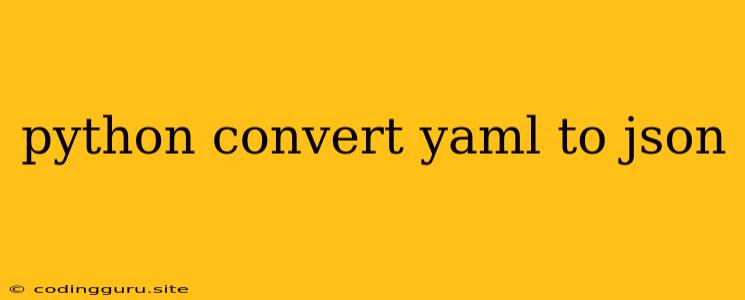Python: Transforming YAML to JSON
In the realm of data manipulation and configuration, YAML (YAML Ain't Markup Language) and JSON (JavaScript Object Notation) are prominent formats. While YAML offers a human-readable and flexible syntax, JSON is favored for its machine-friendliness and widespread adoption. This article delves into the essential technique of converting YAML files to JSON using Python, a versatile and popular programming language.
Why Convert YAML to JSON?
The need to transform YAML to JSON arises in various scenarios:
- Interoperability: JSON is a universal format understood by a wide range of applications and services. Converting YAML to JSON ensures seamless data exchange.
- API Consumption: Many APIs expect data in JSON format. Converting YAML to JSON allows you to readily utilize data from your YAML configurations within APIs.
- Data Processing: Some data processing tools and libraries work efficiently with JSON. Converting YAML to JSON facilitates streamlined data processing.
Python's json Module: The Core
Python's built-in json module is the cornerstone for working with JSON data. This module provides functionalities for encoding Python objects into JSON strings and decoding JSON strings into Python objects. Let's see how it plays a key role in our YAML-to-JSON transformation.
The yaml Module: Your YAML Interpreter
To handle YAML files in Python, we rely on the yaml module. This module offers functionalities for parsing YAML data and representing it as Python objects.
The Conversion Process
The process of converting YAML to JSON in Python involves two fundamental steps:
- Loading YAML: Read the YAML file and convert its contents into a Python object using the
yaml.safe_loadfunction. - Dumping JSON: Serialize the Python object representing the YAML data into a JSON string using the
json.dumpsfunction.
Code Example
import yaml
import json
# Load YAML from a file
with open('data.yaml', 'r') as yaml_file:
data = yaml.safe_load(yaml_file)
# Convert to JSON
json_data = json.dumps(data)
# Print JSON
print(json_data)
In this example, we open the YAML file "data.yaml" in read mode. We use yaml.safe_load to parse the YAML content into a Python dictionary. Finally, json.dumps converts this dictionary into a JSON string.
Key Points
- YAML Structure: YAML supports nested structures, lists, and mappings. These elements are seamlessly preserved during the conversion to JSON.
- Indentation: YAML's indentation plays a crucial role in defining data hierarchy. This hierarchy is translated accurately into the JSON representation.
- Error Handling: It's essential to handle potential errors that might occur during YAML parsing or JSON serialization. Consider using try-except blocks for robustness.
Example: YAML to JSON Conversion
Suppose you have a YAML file "config.yaml" with the following content:
name: My App
version: 1.0.0
settings:
database:
host: localhost
port: 5432
logging:
level: debug
file: app.log
Using the Python code provided earlier, you can convert this YAML data into JSON:
{"name": "My App", "version": "1.0.0", "settings": {"database": {"host": "localhost", "port": 5432}, "logging": {"level": "debug", "file": "app.log"}}}
Alternative Methods
While the yaml and json modules provide a straightforward approach, alternative methods exist. Some libraries offer features like automated serialization and deserialization, making the conversion process even more convenient.
Libraries like pyyaml provide additional functionalities and optimization for working with YAML data. Consider exploring these libraries for advanced scenarios.
Conclusion
Converting YAML to JSON using Python empowers you to harness the benefits of both formats. The yaml and json modules simplify the process, enabling seamless data transformation for various applications. Whether you need to exchange data with APIs, process data efficiently, or leverage the strengths of both formats, Python provides the tools to make it happen.
